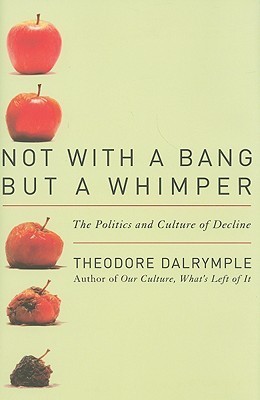What do you think?
Rate this book


252 pages, Hardcover
First published January 1, 2008
Experience has taught me that it is wrong and cruel to suspend judgment, that non-judgmentalism is, at best, indifference to the suffering of others, and, at worst, a disguised form of sadism.
it is one of the most serious defects of modern culture and the welfare state that they discourage self-examination by encouraging the imputation of all miseries to others, and thus have a disastrous effect upon human character
the relation between poverty, even of the relative kind, and crime is far from a straightforward one, and is not directly causative. (If it were, to be poor would be to be criminal: not a very generous or liberal-minded thought, indeed one that is deeply demeaning to millions). The proximal cause of crime is the decision of the criminal to commit it. What goes on in his mind – the ideas he has, his system of morality, his desires, his estimate of his chances of being caught and what will happen to him if he is caught, and so forth – are absolutely crucial
The state has become a vast and intricate system of patronage, whose influence very few can entirely escape. It is essentially corporatist: the central government, avid for power, sets itself up as an authority on everything and claims to be omnicompetent both morally and in practice; and by means of taxation, licensing, regulation and bureaucracy, it destroys the independence of all organisations that intervene between it and the individual citizen.
There is a progression in the minds of men: first the unthinkable becomes thinkable, and then it becomes an orthodoxy whose truth seems so obvious that no one remembers that anyone ever thought differently.
An institution such as prison can work for society even if it does not work for an individual.
heroin addiction is fundamentally a problem of the soul, if I may so put it: it is a problem of the meaning of life and of meaning in life.
Samuel Beckett came up with a memorable line: ‘God doesn’t exist – the bastard!’ [...] Beckett’s line implies that God’s existence would solve some kind of problem – actually, a profound one: the transcendent purpose of human existence
Metaphysics is like nature: though you throw it out with a pitchfork, it always returns.
To regret religion is, in fact, to regret our civilisation and its monuments, its achievements and its legacy
All of Ballard’s novels have a Robinson Crusoe theme: What happens to man when the props of civilisation are removed from him, as they so easily are, by external circumstances or by the operation of his secret desires, or by both in concert? Ballard’s past gave him an awareness of the fragility of things, even when they appear most solid
When, as I have, you have met hundreds, perhaps thousands, of people abandoned in their childhood by one or both of their parents, on essentially the same grounds (‘I need my own space’), and you have seen the lasting despair and damage that such abandonment causes, it is difficult to read or see A Doll’s House without anger and revulsion
With a very limited vocabulary, it is impossible to make, or at least to express, important distinctions and to examine any question with conceptual care. My patients often had no words to describe what they were feeling, except in the crudest possible way, with expostulations, exclamations and physical displays of emotion.
His thoughts were too complex for the words and the syntax available to him.
one goat can undo in an afternoon what it has taken decades to establish.